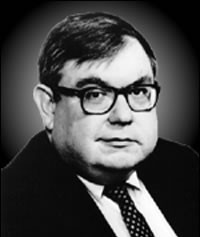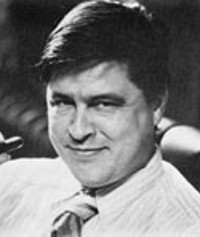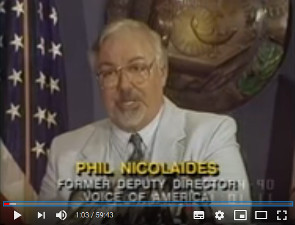 Samuel T. Francis
Samuel T. Francis
Championing
Western Civilization
and the great legacies of
Sam Francis and Joe Sobran
and their allies
 Joseph Sobran
Joseph Sobran
FGF Op-Ed
THE REACTIONARY UTOPIAN
June 28, 2019
Good Night, Sweet Prince
by Joe Sobran
Fitzgerald Griffin Foundation
Publisher’s Note: Philip Nicolaides, who was instrumental in the founding of the newsletter Sobran’s: The Real News of the Month, and Joe Sobran’s closest friend, died on June 25, 1994. Here is a column that Sobran wrote after his passing.
If there was humor in any situation, Phil was the man not only to find it but to magnify it to hilarious dimensions.
Subtracting Christianity: Essays on American Culture and Society — Phil Nicolaides made national headlines only once. In 1981, as Ronald Reagan’s deputy director of the Voice of America, he urged the VOA to push pro-American and anti-Soviet propaganda. He used the word “propaganda,” too, because, knowing Latin as he did, he knew what it meant: things to be propagated. But the word scandalized the media, and there was a big uproar, and Phil was forced to resign.
Was he bitter? I’ll tell you how hard he took it. During the talk radio debate on whether he should resign, Phil called a local station anonymously, using one of his dozens of fake foreign accents, and vocally disguised as a Russian refugee from Communism, vigorously defended himself in the third person. He and his friends thought it was a howl.
Think of a Falstaff who had gone straight, studied Aquinas, and retained his sense of humor and imagination, giving a wonderful twinkle to every occasion, and you’ve got at least the faint idea of Phil.
If there was humor in any situation, Phil was the man not only to find it but to magnify it to hilarious dimensions. I can’t really describe him, but he was, to put it very pedantically, the functional equivalent of Sir John Falstaff. Think of a Falstaff who had gone straight, studied Aquinas, and retained his sense of humor and imagination, giving a wonderful twinkle to every occasion, and you’ve got at least the faint idea of Phil.
Phil shocked us all last week by dying. It wasn’t like him. True, he’d had heart surgery years ago, hadn’t taken care of himself, had resumed his Falstaffian dimensions, and then got cancer and went into surgery Friday. But that hardly seemed sufficient to extinguish such a merry flame as Phil’s.
Mimicry was one of Phil’s roughly forty talents. He was a splendid singer, a gifted artist, a pianist, a linguist, a wit, all in all the most charming, entertaining, talented man most of his friends (including me) had ever met.
I went to see him, for what turned out to be the last time, a couple of hours before the operation, with my seven-year-old. Phil was already groggy from the drugs they’d pumped into him, but even on his back he couldn’t resist clowning for Joey, contorting his athletic eyebrows, crossing his eyes, and sticking his tongue out sideways. A few hours later I got the bad news.
I keep hoping this is just one of his pranks, like the time he collected a debt for a friend by phoning the delinquent in an ominously raspy voice and, affecting to struggle with big words a la Luca Brasi, mumbled: “A man oughta meet his, whaddya call ‘em, business obligations, know what I’m sayin’?” Next day, debt paid.
Mimicry was one of Phil’s roughly forty talents. At one time he’d been an actor, understudying George C. Scott’s Richard III and occasionally stepping into the part himself. He was a splendid singer, a gifted artist, a pianist, a linguist, a wit, all in all the most charming, entertaining, talented man most of his friends (including me) had ever met.
His mind was like an otter, always enjoying its own vast energy and savoring its freedom of movement, finding humor even in abstract ideas.
And even that doesn’t begin to do justice to him. He was a brilliant thinker and teacher. And just a sweet man. He’d been voted teacher of the year once by the students at Fordham University, where he’d taught philosophy and psychology. He and children warmed to each other right away, and he had a way of explaining things to them vividly, tenderly, amusingly, at their own level, whether they were small children or adolescents.
“His religion is so private he won’t even impose it on himself.”
— Phil Nicolaides describing a pro-abortion politician
Gee, he was fun. Every minute. His mind was like an otter, always enjoying its own vast energy and savoring its freedom of movement, finding humor even in abstract ideas. A typical witticism was his quip about a pro-abortion Catholic politician of loose morals: “His religion is so private he won’t even impose it on himself.”
The only conservative who found use for his boundless talents in his last years was Pat Buchanan. The bond between the two men was not total agreement: it was deep mutual respect.
Phil had courage, too, though he never called attention to it. He broke with other conservatives over the Gulf War and, probably as a result, lost his current job soon afterward. He was an orthodox Catholic, and a devout one, but he didn’t recognize any political orthodoxy. That left him largely unemployed. The only conservative who found use for his boundless talents in his last years was Pat Buchanan. The bond between the two men was not total agreement: it was deep mutual respect.
Phil didn’t expect to die of his surgery, but he knew there was a chance. He thanked God for a good life and readied himself. Now his friends thank God for 64 years of Phil Nicolaides, and how we wish it could have been 65.
###
Copyright @ 2025 by the Fitzgerald Griffin Foundation. All rights reserved. This article was published by Universal Press Syndicate on June 28, 1994. It is one of the 117 columns in the 456-page anthology of Mr. Sobran’s writings: Subtracting Christianity: Essays on American Culture and Society (FGF Books, 2015).
Joe Sobran was an author, syndicated columnist, editor of Sobran’s: The Real News of the Month, a radio commentator, and sought-after speaker and lecturer.
To support the legacy of Joe Sobran’s great body of work, please donate online
Or send a check to: Fitzgerald Griffin Foundation344 Maple Avenue West, #281
Vienna, VA 22180
1-877-726-0058
publishing@fgfbooks.com
Or call toll-free at 1-877-726-0058 to donate by phone. For more information, write to Fran Griffin at fgf@fgfBooks.com
